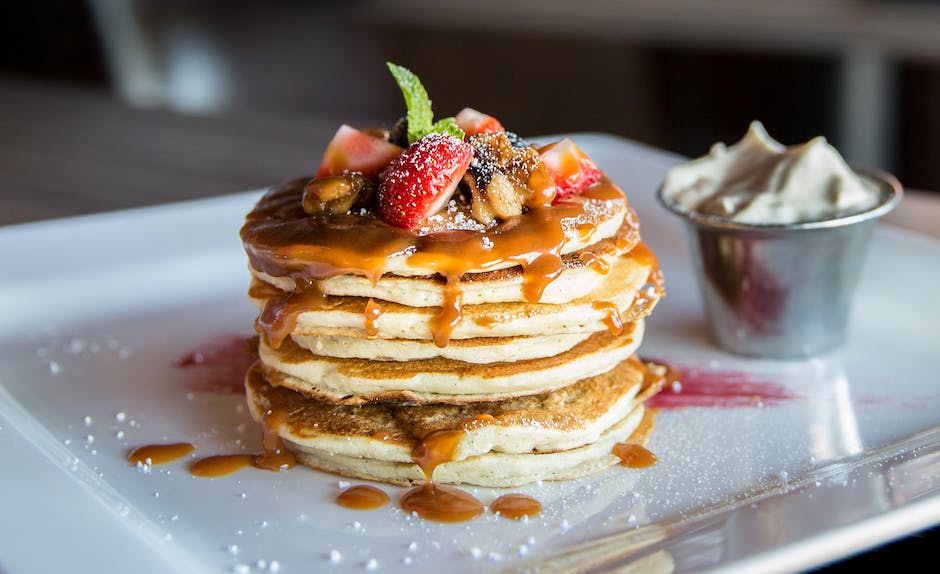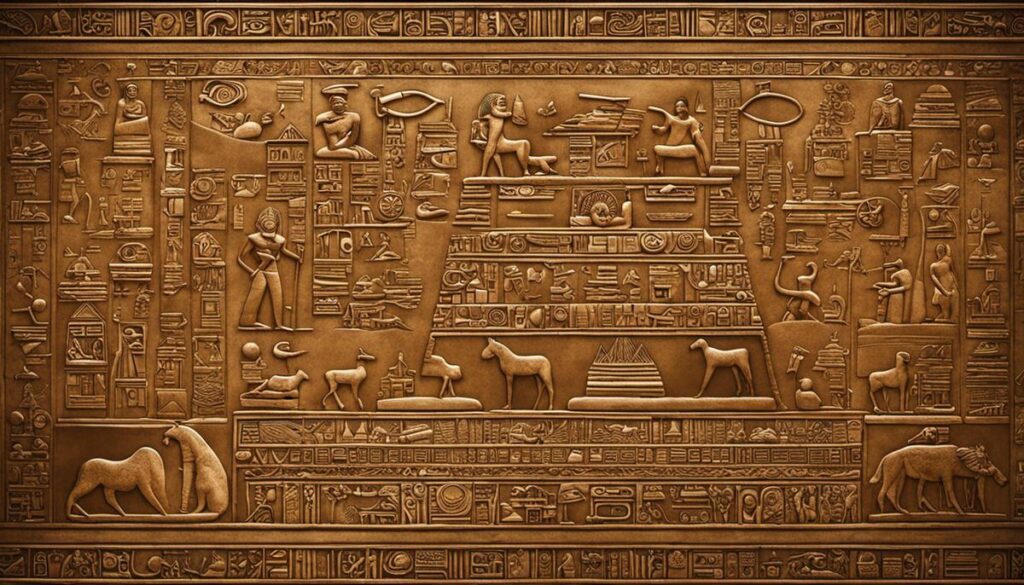Throughout history, dreams have captivated the human psyche, often leaving us to ponder their mysteries and seek deeper understanding. The rich tapestry of Biblical narratives gives us a framework through which to view our own dreams, especially when we find ourselves dining in the realm of slumber. Our journey into the Biblical perspectives on dreams and visions uncovers a world where each nocturnal banquet holds profound spiritual significance, opening a dialogue with the divine that extends beyond our waking consciousness. Food items like bread, wine, and meat take on symbolic roles and narrate stories rooted in the wisdom of ancient scriptures, presenting us with a unique opportunity to decipher the messages encoded within our dreamscapes.
Biblical Perspectives on Dreams and Visions
Unlocking the Mystique of Divine Whispers: Dreams in Biblical Lore
In the theater of the night sky, where stars are mere spectators to our deepest slumbers, the Bible unfurls a tapestry of dreams that serve a purpose far beyond the ordinary. Throughout sacred scripture, dreams emerge not as mere figments of the subconscious, but as divine communiqués, pivotal in shaping the destinies of prophets, kings, and nations. This is a tale of celestial visions, woven into the very fabric of biblical spirituality, that illuminate the enigmatic intersection of heavenly messages and earthly journeys.
When the world plunges into sleep and the conscious mind hushes its clamor, dreams become the canvas upon which the divine paints messages of hope, warning, and prophecy. To discern the spiritual significance of dreams in the Bible is to delve into a narrative where ethereal experiences carry a weight that tugs at the strings of reality.
Panoramic Visions and Prophetic Parables
The Book of Genesis offers one of the earliest glimpses into the spiritual pedigree of dreams. Joseph, with his multi-hued cloak and earnest gaze, stands as the archetypal dreamer whose dreams of celestial bodies bowing before him hint at a future of ascendancy and influence. Yet, Joseph’s skill lay not only in receiving dreams but in interpreting the pharaoh’s cryptic visions—visions that would ultimately save Egypt from famine and solidify Joseph’s place in the annals of divine intermediaries.
Dreams as Divine Dispatches
Beyond presaging personal destiny, dreams in the Bible often serve as conduits for divine intervention. For instance, Daniel, the revealer of mysteries, decodes the sleep-disturbed musings of Babylonian royalty, unmasking imminent shifts in the winds of power. Here, within the gossamer fibers of night visions, we unearth a spiritual insight—dreams are a channel through which the divine seeks to influence the course of human events.
Divine Warnings in Night Seasons
In the whispers of the night, dreams also emerge as heavenly harbingers of caution. The book of Matthew recounts the story of Joseph, the guardian of Christ’s early days, receiving nocturnal inklings to flee impending dangers—a narrative arc that pulls back the curtain on a spiritual truth: dreams may carry within them life-altering alerts from beyond the veil.
Epiphanies of the Common and the Sacred
Yet, the Bible does not cloister the significance of dreams within the lofty echelons of prophets and pharaohs. Rather, it casts a wider net, suggesting that even the least likely among us might be recipient to a night-time epiphany. The New Testament unfolds this narrative, revealing dreams that guide the Magi and offer solace and direction to the painfully ordinary, drawing a throughline that connects the spiritual to the everyday.
In the hallowed library of biblical literature, dreams are seldom dismissed as mere mental meanderings. They are, instead, venerated as spiritual signposts, pointing toward divine wisdom and the interplay between realms seen and unseen. The web of dreams woven into holy writ invites onlookers and believers alike to contemplate the possibility that, perhaps, every dream is an opportunity to glimpse the eternal reaching out to the temporal.
While modernity may attribute dreams to the subconscious mind’s inner workings, the Bible holds up the dream as a lantern in the stillness of night—casting light upon paths of insight, forewarning, and divine dialogue. It is a narrative that echoes through the ages, reminding us that sometimes the most profound revelations come not with a shout but with a whisper in the dark.

Common Dream Symbols and Their Meanings
“Deciphering the Plate of the Unconscious: The Symbolic Language of Food in Dreams”
Imagine this: you’re wandering through a dreamscape, famished, when suddenly, a table laden with delectable dishes materializes before you. Your subconscious mind has just sent you a VIP invitation to the banquet of symbols! In the realm of dreams, where every element is steeped in significance, food often serves a dual role—comforting the soul and feeding the mind with metaphors. So, grab your cutlery (or dream dictionary), and let’s unravel the meaning behind these nocturnal nibbles.
First on the menu, we have fruits, which frequently embody desires and sensual pleasures. A ripe, juicy apple might seem like a mouthwatering delight, but beyond its luscious appearance, it may hint at the dreamer’s temptation or fall into indulgence. Meanwhile, a bunch of grapes could whisper tales of prosperity and luxury, inviting the sleeper to taste the rich rewards they strive for.
Bread, humanity’s ancient staple, bears a weighty symbolism. A fresh loaf speaks of basic needs met, the simplicity of nourishment, and a connection to the earth. Conversely, moldy or stale bread could signal neglect or scarcity, reminding us that our most basic requirements must not be overlooked.
Savoring chocolate in one’s slumber is a common experience filled with connotations of self-reward and indulgence. It’s as if the subconscious is encouraging a little self-love and pampering. However, if gorging on sweets takes a turn for the excessive, beware—the dream might be hinting at an unbalanced pursuit of pleasure.
Dreaming of fish? You’ve likely caught a symbol of fertility, abundance, or the onset of change. This underwater bounty can suggest a leap of faith is necessary or that one’s about to embark on a deep dive into the unconscious.
Representing a grand celebration or accomplishment, a dream about cakes whispers of the sweet taste of success. However, details matter here: is the cake half-eaten, suggesting a job half-done, or is it a magnificent spectacle that signifies one’s hard work has paid off gloriously?
Engaging in a luxurious feast in your nighttime narratives often mirrors contentment or a life well-lived. Alternatively, an over-the-top banquet could be expressing hidden fears of excess or highlighting the dreamer’s appetite for life’s finer things.
Lastly, as one navigates the often-foreign land of dreams, eating oddities like insects or unpalatable substances might indicate nourishing oneself with unconventional knowledge or absorbing something that doesn’t quite agree with one’s soul.
To sum up this course of thought, food in dreams exquisitely mirrors the complexities of life’s appetites, desires, and needs. Whether you wake up to your stomach growling or your mind racing to decipher the messages left by your inner chef, remember that each dream dish is carefully prepared by your subconscious, seasoned with personal experiences, and meant to be digested with introspective care. Bon appétit, dreamers!

Connecting Dreams to Daily Life
Decoding the Banquet of Dreams: A Taste of the Psyche’s Desire
Dream dining is more than just a midnight snack of the mind; it’s a lavish spread that holds the keys to understanding our waking desires, fears, and spiritual longings. While ancient texts like the Bible have long recognized the profound significance dreams hold, today’s interpretations serve up a more personal flavor to the universal phenomenon of dream symbolism.
In the spacious room of dreams, food often takes center stage. When fruits appear, slicing through the subconscious, they are ripe with meaning. Pomegranates might burst with seeds of potential, while apples could echo with the crisp bite of knowledge or temptation. The food we encounter in dreams often mirrors our internal gardens, signaling growth or areas that need tending.
Ah, bread! This humble staple carries the weight of sustenance and simple pleasures. To dream of bread is to be connected to the very earth itself, representing our most fundamental needs for nourishment and stability. Just as we knead the dough, we are reminded to tend to our basic requirements for survival and comfort.
Chocolate drizzles into our dreamscape with sweet allure. When this decadent treat appears, it invites self-reflection on personal rewards and the indulgence of the senses. To dream of chocolate may not just be a signal to cut back on dessert but rather to acknowledge self-care and the small luxuries that sweeten daily life.
Imagine the glistening scales of fish flickering through dream rivers. Here lies a symbol of fertility and the fluidity of life’s changes. To dream of fish could hint at an impending transformation or the abundance waiting to leap into reality’s net if one is only patient and open enough to reel it in.
Cakes rise in dreams as the pinnacle of celebration and the icing on the cake of success. In the theater of the mind, these confections highlight life’s milestones and achievements, inviting dreamers to savor their sweet victories or anticipate joyous occasions on the horizon.
Summon a dream banquet: tables heaving with luxurious feasts unfold scenes of contentment, underlining desires for a life adorned with the finer things. Such dreams can reflect the satisfaction of life’s current state or an aspirational hunger, yearning to taste what presently lies just beyond the palate’s reach.
Remarkably, not all dream menus are designed to appeal. The crunch of ingesting insects or unappetizing fare can jolt a sleeper awake, yet they could symbolize the necessary absorption of life lessons that may be difficult to swallow but essential for growth.
Ultimately, food in dreams serves an eclectic buffet of our life’s appetites, desires, and needs. It invites dreamers to the table for introspection, urging them to savor the layered flavors of their experiences, to feast on the array of emotions, and to nourish the soul with insight. The banquet of dreams is in session; let the feast unravel its delicious secrets.

The Psychological Aspect of Dreams About Eating
((TEXT START))Diving deeper into the dream-laced exploration of our psyche, the intrigue intensifies with the topic of eating in dreams. Often overlooked, this particular motif in our nocturnal narratives has more to say about our inner life than many realize.
Picture this: a cornucopia of endless delights appearing in a slumbering sequence. From lavish banquets filled with gilded plates to the simplicities of snacking on decadent dark chocolate, each element within our dream world carries a potent psychological significance.
Psychologists link the act of eating in dreams to various facets of our waking life, from emotional fulfillment to underlying anxieties. So let’s slice through the tempting layers of dream-food interpretations.
Experiencing a dream where eating is front and center could denote a voracious appetite for life, signifying an embrace of new experiences with unrestrained relish. Conversely, biting into a forbidden fruit might signal a subliminal temptation or a hidden craving for what’s tantalizingly out of reach. It compels dreamers to question: what forbidden fruits are lurking in the shadows of your psyche?
Now consider the more indulgent side of things. The act of enjoying rich, opulent feasts can reflect a sense of achievement or a desire for more luxurious and rewarding experiences. Perhaps it’s a nudge to celebrate life’s victories more abundantly or a stirring reminder to seek satisfaction that’s richer than the mundane.
But what about the less savory moments? Dreams of consuming insects or bitter morsels could illustrate internal worries or issues that are hard to swallow. These dreams can be jarring, offering a wake-up call to confront what might be bugging us in daylight hours.
For a dash of introspection, think about the last time your dreams featured a meal. Was it a solo affair or a shared experience? Eating alone might reflect independence or solitude, while dining with others could symbolize communal connections or the sharing of ideas.
Above all, dreams where eating is central invite reflection and self-examination. Whether it’s realizing a need to nourish the body and soul with healthier choices or understanding personal growth by feasting upon new knowledge and insights, the subconscious mind serves a buffet of clues about our mental and emotional state.
In essence, savoring these slumbering suppers can provide tastes of wisdom, making it crucial to not just dismiss them as midnight munchies of the mind. Like waking life, every detail in dreams might be enriched with meaning, and it’s up to dreamers to taste-test their way to a deeper understanding of themselves. Bon appétit, dreamers!
((TEXT END))
Interpretation Practices
Ah, dreams — those enigmatic, nighttime narratives that can leave you pondering their meanings long after you’ve sipped your morning matcha latte. Today, we are diving fork-first into the mysterious world of dreams where food takes center stage. Understanding these edible enigmas through a biblical lens gives us a banquet of insight.
Picture this: a table laden with delectable dishes, a cinematic sequence straight from a dreamscape. In the Bible, the act of eating in dreams often transcends basic sustenance, serving up rich layers of symbolism to feast upon spiritually.
Take for example the vivid visions that involve vineyards and vegetables — scenes right out of a celestial cookbook. In biblical times, consuming fruits in dreams could reflect the dreamer’s personal harvest of spiritual fruits — love, joy, peace, patience, and all their friends (Galatians 5:22-23) — or lack thereof. This interpretation invites one to savor the growth of their character, their spiritual journey ripe with potential.
Moving onto the heartier fare, did you ever dream of scooping up a slice of bread, the staff of life, with its humble yet profound implications? Bread in dreams, particularly when broken and shared, can resonate with the communal feasting on spiritual truths, echoing the Holy Communion — an invitation to ‘taste and see that the Lord is good,’ (Psalm 34:8).
If you’ve ever found yourself indulging in the creamy decadence of dream chocolate, you might be mulling over more than your sweet tooth. Such dreams could symbolize a moment of self-care or the need to sweeten a bitter reality.
For those who dream of fish — multitaskers take note — these aquatic dream cameos might allude to prolific creativity and fertility in ideas as they weave through your subconscious sea. Perhaps it’s a nudge to ‘cast your nets’ and embrace change, reflecting the miraculous catch that Peter experienced (Luke 5:4-11).
And what of those dreams featuring confectionary triumphs like cakes? It’s possible they mirror the joyous milestones in one’s life’s journey — think spiritual victories and sugary accolades — a divine pat on the back for a job well done.
But it’s not all banquets and bounties. Sometimes the dream menu serves up insects or less-than-palatable fare. Such dream dining could be suggesting a ‘tough to swallow’ circumstance or a challenge being digested internally, urging one to confront and consume their fears or discomforts.
When dining alone in dreams or amidst a crowd, one might reflect on the state of their relationships and their place at life’s grand table. Are they savoring connections or feeling a pang of solitary hunger?
Ultimately, these nocturnal noshing sessions challenge dreamers to engage in some soul food for thought. By plunging into this mysterious culinary symbolism, one might just find the recipe for deeper self-awareness and divine understanding. After all, while these biblical interpretations offer guidance, the most satiating insights often stem from the dreamer’s own life and spiritual palette.
As we nibble on these thoughts, let’s remember that the dream world’s menus are personalized. It’s not so much about cracking a one-size-fits-all code but rather about contemplating what these dreamtime tastings reveal about our deepest yearnings and the divine dialogue in which we’re invited to partake.
So next time dreamland serves up a meal, rather than brushing off these bedtime banquets as mere figments of the imagination, consider pulling up a chair and unpacking the spiritual sustenance offered in each bite. It’s a banquet of symbolism where every morsel matters, and each one of us is invited to dine with discernment. Bon appétit to the soul!

Dreams and Spiritual Growth
Dive into the Delicacies of the Dream World: Unearthing the Spiritual Sustenance of Slumber Snacking
Have you ever woken up with the flavor of a dream meal lingering on your consciousness, as vibrant and tangible as the latest runway trends? Dreams about food are more than random midnight musings; they are a rich tapestry of symbols and signs that serve haute couture for the soul. Let’s unravel the thread count of these nocturnal narratives and see what they’re really serving up.
Dining alone in a dream? It might be a moment to savor solitude or a nudge to nurture the relationships feeding your daily life. Reflecting on who pulls up a chair at your dream dinner table can shine a limelight on your social appetites or call out for a dash more connection in the waking world. Whether dining tête-à-tête with a celebrity or cozying up at a family feast, the company you keep in your dreamscapes can mirror the entourages you long for or warn of energies that may not deserve a place setting in your reality.
But let’s not forget about those unconventional dream edibles that have us reaching for a palate cleanse upon awakening. Insects or less-than-gourmet offerings in dreams might crinkle your nose, yet they’re buzz-worthy in the realm of dream analysis. Such imagery can often signify the unpalatable challenges we’re being served in our waking hours. Embrace these dreams as a tasting menu for the subconscious, urging us to chew over the less savory aspects of our lives that may require digestion.
And what of those sacred staples like bread and fish that slip into our slumber stories? They break beyond the bounds of biblical times, serving up fresh spiritual insights. Dream loaves can hint at our hunger for grounding or whisper of nourishment on a soul level, while aquatic dream encounters suggest an ocean of creativity and the fluidity to navigate life’s tides.
For those with a sweet tooth in their subconscious, the appearance of chocolate in one’s dream life is akin to a divine dessert cart. It can point to the decadent delights of self-love rituals or hint at overindulgence. Balance, as in all things, is key—not just in your wardrobe choices, but in the confections of your unconscious.
These slumber snacks, whether a single grape or a grand gala of gastronomy, invite us to focus our lenses—both the camera kind and our inner perspectives—to capture the photographic truth of our deeper yearnings. By interpreting the feast of symbolism set before us, we can craft a dream diet that nourishes not just the body but also the essence of who we are.
In closing, remember that every morsel of a dream can feed the story of self, so bon appétit on your journey to divine dining and deeper understanding. Keep paying attention to these metaphysical meals; after all, they provide the ultimate food for thought. Now, sweet dreams and may your spiritual growth be as satisfying as your most cherished midnight snack.

As we navigate the intricate process of interpreting the spiritual language of our dreams, we come full circle in recognizing the intricate role they play in our spiritual growth. The act of eating in dreams, informed by Biblical wisdom and psychological insight, provides a reflective mirror to our inner being. Such dreams foster a conscious awareness that aligns our actions with our values and guides us toward a more enlightened path. Embracing the art of dream interpretation allows us to feast on the knowledge within, cultivating a rich soil in which our spiritual lives can flourish and bear fruit in the waking world.







